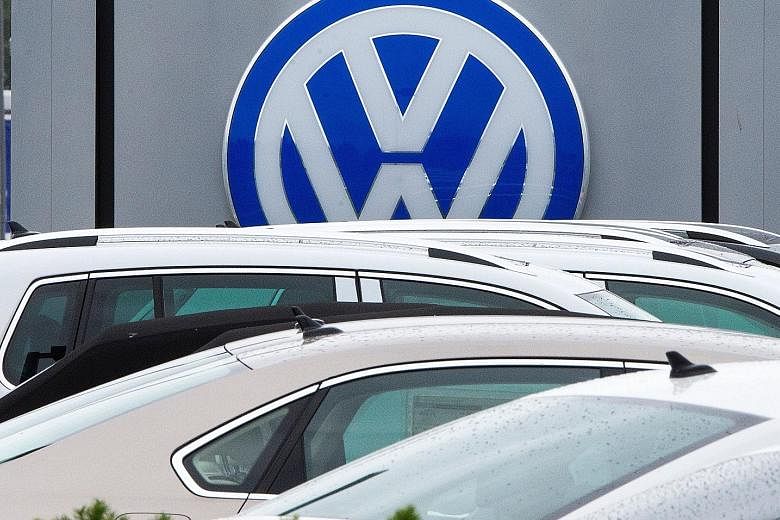FRANKFURT • Germany's high-end carmakers face a potentially destructive new scandal after the European antitrust authorities said they were looking into allegations that Volkswagen, Daimler and BMW colluded illegally to hold down the prices of crucial technology, including emissions equipment.
If proven, the allegations threaten to further damage the country's reputation for engineering excellence.
That reputation had been badly tarnished by Volkswagen's admission that it illegally installed software in its diesel-powered cars to evade standards for reducing smog.
The emissions scandal, which came to light nearly two years ago, may be spreading to rivals.
Growing awareness of the harmful effects of diesel fumes has prompted European cities to consider bans on diesel cars, and has led consumers to reject vehicles with diesel engines, a largely German innovation that traditionally accounted for half the market.
The backlash could take on a new, far broader dimension if it turns out that the excess emissions were the result of illegal collusion by a de facto cartel.
The investigation could also lead to billions of euros in fines.
In a statement last Saturday, the European Commission partially confirmed a report in Germany's Der Spiegel magazine that said the authorities were investigating evidence that representatives of the carmakers met regularly to agree on technical specifications for everything from brakes to clutches to emissions systems.
The collusion began in the mid-1990s and continued until recently, according to Der Spiegel, which said it had seen documents that were part of an antitrust probe.
The Spiegel article said one aim of the collusion was to obstruct competition, with the carmakers agreeing on costs for components or technical details such as convertible roofs. For example, many reduced pollution controls at temperatures below 20 deg C, supposedly to protect engines from damage. Regulators did not notice because they tested cars only at temperatures above 20 deg C.
In 2006, according to the magazine, the German carmakers agreed to limit the size of the tanks used to hold a chemical solution that helps neutralise diesel emissions.
Volkswagen and its Audi division have previously admitted in court documents that the tanks they installed in their cars did not hold enough of the solution, known as AdBlue, to last between oil changes.
The commission said it and the German Cartel Office "have received information on this matter, which is currently being assessed by the commission".
The statement gave no details.
"It is premature at this stage to speculate further," the commission said.
Spokesmen for Volkswagen, Daimler and BMW declined to comment last Saturday. Volkswagen and Daimler have admitted some of the allegations to the authorities, according to Der Spiegel.
The crisis has also taken on political dimensions. German Chancellor Angela Merkel has tried to distance herself from the auto industry amid criticism that her government had lobbied for lax European emissions regulations that contributed to the scandal.
"The diesel scandal came about because our politicians passed bad laws," Dr Ferdinand Dudenhoffer, a professor at the University of Duisburg-Essen who follows the industry, said in an e-mail last Saturday.
Though allegations of collusion are new, it was already clear that vehicles sold by almost all carmakers in Europe pollute more in everyday use than in tests.
As a result, levels of harmful nitrogen oxides are higher in urban areas than they would be if carmakers were adhering to pollution standards.
NYTIMES, BLOOMBERG

